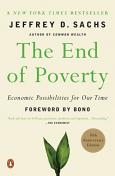BKMT READING GUIDES
The End of Poverty: Economic Possibilities for Our Time
by Jeffrey Sachs
Paperback : 448 pages
1 club reading this now
0 members have read this book
Introduction
Jeffrey D. Sachs has been cited by The New York Times Magazine as “probably the most important economist in the world” and by Time as “the world’s best-known economist.” He has advised an extraordinary range of world leaders and international institutions on the full range of issues related to creating economic success and reducing the world’s poverty and misery. Now, at last, he draws on his entire twenty-five-year body of experience to offer a thrilling and inspiring big-picture vision of the keys to economic success in the world today and the steps that are necessary to achieve prosperity for all.
Marrying vivid eyewitness storytelling to his laserlike analysis, Jeffrey Sachs sets the stage by drawing a vivid conceptual map of the world economy and the different categories into which countries fall. Then, in a tour de force of elegance and compression, he explains why, over the past two hundred years, wealth has diverged across the planet in the manner that it has and why the poorest nations have been so markedly unable to escape the cruel vortex of poverty. The groundwork laid, he explains his methods for arriving, like a clinical internist, at a holistic diagnosis of a country’s situation and the options it faces. Rather than deliver a worldview to readers from on high, Sachs leads them along the learning path he himself followed, telling the remarkable stories of his own work in Bolivia, Poland, Russia, India, China, and Africa as a way to bring readers to a broad-based understanding of the array of issues countries can face and the way the issues interrelate. He concludes by drawing on everything he has learned to offer an integrated set of solutions to the interwoven economic, political, environmental, and social problems that most frequently hold societies back. In the end, he leaves readers with an understanding, not of how daunting the world’s problems are, but how solvable they are—and why making the effort is a matter both of moral obligation and strategic self-interest. A work of profound moral and intellectual vision that grows out of unprecedented real-world experience, The End of Poverty is a road map to a safer, more prosperous future for the world.
Editorial Review
Celebrated economist Jeffrey Sachs has a plan to eliminate extreme poverty around the world by 2025. If you think that is too ambitious or wildly unrealistic, you need to read this book. His focus is on the one billion poorest individuals around the world who are caught in a poverty trap of disease, physical isolation, environmental stress, political instability, and lack of access to capital, technology, medicine, and education. The goal is to help these people reach the first rung on the "ladder of economic development" so they can rise above mere subsistence level and achieve some control over their economic futures and their lives. To do this, Sachs proposes nine specific steps, which he explains in great detail in The End of Poverty. Though his plan certainly requires the help of rich nations, the financial assistance Sachs calls for is surprisingly modest--more than is now provided, but within the bounds of what has been promised in the past. For the U.S., for instance, it would mean raising foreign aid from just 0.14 percent of GNP to 0.7 percent. Sachs does not view such help as a handout but rather an investment in global economic growth that will add to the security of all nations. In presenting his argument, he offers a comprehensive education on global economics, including why globalization should be embraced rather than fought, why international institutions such as the United Nations, International Monetary Fund, and World Bank need to play a strong role in this effort, and the reasons why extreme poverty exists in the midst of great wealth. He also shatters some persistent myths about poor people and shows how developing nations can do more to help themselves.Despite some crushing statistics, The End of Poverty is a hopeful book. Based on a tremendous amount of data and his own experiences working as an economic advisor to the UN and several individual nations, Sachs makes a strong moral, economic, and political case for why countries and individuals should battle poverty with the same commitment and focus normally reserved for waging war. This important book not only makes the end of poverty seem realistic, but in the best interest of everyone on the planet, rich and poor alike. --Shawn Carkonen
Discussion Questions
No discussion questions at this time.Book Club Recommendations
Recommended to book clubs by 0 of 0 members.
Book Club HQ to over 90,000+ book clubs and ready to welcome yours.
Get free weekly updates on top club picks, book giveaways, author events and more








